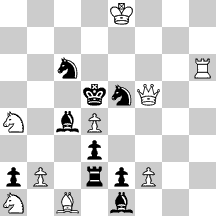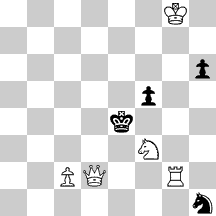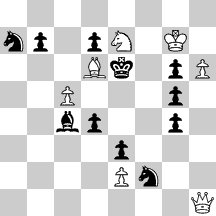Cleveland Leader, 1876
Marc,* (20) W. A. Shinkman (29), D. Melissinos (Greece) (45), C. C. Moore (6),
Marc,* (5) W. A. Shinkman (31, 32, 33, 38), T. M. Brown (9), J. F. King (44), S. Loyd (3), W. D. Robinson, Sr. (12), J. F. King (13), V. Gorgias (49).
(The list of hm awards follows the order as published by Cleveland Sunday Morning Voice.]
The chess column of Cleveland Leader moved to Cleveland Sunday
Morning Voice between 1876-12-21 and 1877-02-04.
From this date, the column usually refers to the tourney as The Voice Tourney
.
On December 7, 1876, as the tourney closes, 83 problems are stated to
have been received. 67 problems are published: the balance probably
being made up of problems found to be faulty on first examination.
The judge's report disagrees with the number of received problems:
it says that 91 problems were entered, 38 of which were found to be
faulty.
The judge observes that he was almost at a loss to choose the best of
problems 36 and 37 (both entereed under the motto Press on).
If they should prove to be by the same author (which the use of the same
motto made probable), he would have to choose another for the second
prize. This suggests that there was an unpublished(?) understanding that
a prize winner could only receive one prize. As the judge says
It is not improbable that [the 2nd prize winner] will prove more
popular than [nos. 36 and 37], but it can hardly be doubted, for all
that, that Nos. 36 and 37 are more truly great,
there is a
relatively clear expression of ranking between the named problems.
Oddly enough, problem 36 (the non-prize winner) it is not on the list
of problems receiving an honorary mention; it was published
after the prize-winners on 1877-11-25, but before the hm. was published
the following week. It has been entered as a 'special mention' in the
award list above, to reflect its special position as 'better than second prize but (apparently) excluded from being awarded a prize'.
The second-prize winning problem by S. Loyd is very similar to
a problem by Shinkman. A. C. White (in Sam Loyd and his Chess Problems, p. 85) notes
that Shinkman privately asked Carpenter if his problem had been
anticipated
in Oct. 1877, six weeks after the Cleveland Leader Tourney had
been closed for US participants. Carpenter does not draw any attention
to this coincidence in his report, but is seems unlikely that he
did not notice it.
* According to part 10 of F. M. Teed's series American Problem Composers (American Chess Magazine, 2/11 (May, 1899), p. 459
) the pseudonym Marc
was used by Chas. [=Charles] L.
Fitch in his early career as composer. (See also Gaige: Chess Personalia, p. 120.)
Prizes
Prize: 1 Pr. F. W. Martindale

#3
Prize: 2 Pr. S. Loyd

#3
Prize: 3 Pr. W. A. Shinkman

#3